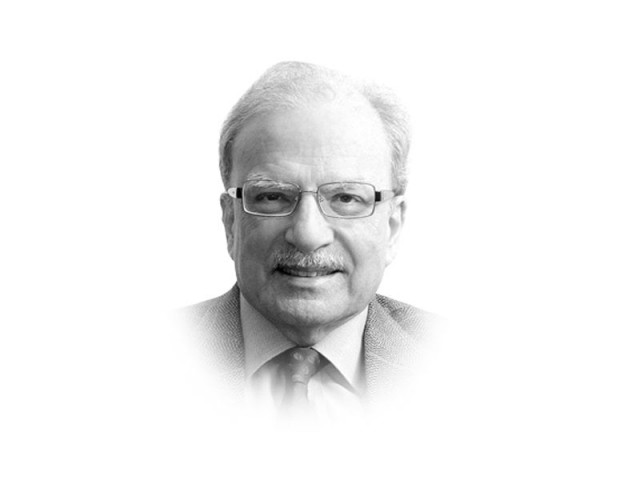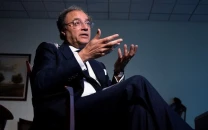Is the global economy in trouble?
The recent stock markets rise in the United States has created the expectation of a major correction

The writer is a former caretaker finance minister and served as vice-president at the World Bank
Before troubles hit the Wall Street and brought about tremendous volatility, there was a growing consensus among economists that the world economy had moved into a happy state, extending the period of recovery that began almost a decade ago. This in itself was unusual since, reading from history, recoveries have not lasted for more than six to eight years. The present recovery started in 2009 and is expected to last for at least a decade. The world’s largest economies are all expanding at reasonable rates. The United States is in the lead but even Europe has shown a surprising strength. After a deep slumber, Japan is waking up while China seems to have adjusted well to the new development paradigm it has adopted to maintain a healthy rate of growth for years to come. The world trade had also begun to pick up.
The US Federal Reserve saw enough strength in the economy to indicate that it would start trimming down its balance sheet that had expanded enormously during the period of ‘quantitative easing’. This involved the bank printing new money to buy corporate bonds and thus pumping added liquidity into the markets. This was a relatively new approach for dealing with an economic slowdown. In earlier periods, governments were Keynesian in the sense that they had used the budget to prime the pump and aid the economy. This has become politically difficult to do both in the United States and in Europe. Politicians on both sides of the Atlantic are reluctant to increase the amount of debt carried by governments. The central bank stepped in to do what the finance ministry should have done. There are now signals from the central banks that they would opt out of this approach. This indication may have troubled the markets. But that was not the primary reason.
Most serious economists believe that there are poor links between the performance of the stock markets and the state of the economy. When stocks tumbled in 1987, the economist Robert Shiller conducted a survey of investor motivations. He found that the crash was the result of a self-fulfilling panic. Recalling Shiller’s work, Paul Krugman, Nobel Prize winning economist, wrote as follows: “People weren’t selling because some news caused them to revise their views about stock values; they sold because they saw other people were selling.” The same could be happening now. Investors may be rushing in to cash the gains they have made in the last one year.
The recent stock markets rise in the United States has created the expectation of a major correction. What had come to be called the Trump Bump was not based on solid economic grounds. The American president had promised to lower the tax burden of his country’s corporations. Before the tax law passed by his administration came into force, the rate of corporate tax in the United States was the highest among the world’s rich countries. A number of companies had parked large amounts of their earnings outside the country, mostly in Europe. By lowering the tax rate, they were expected to bring back hundreds of billions of dollars home and invest in the economy. This would raise the rate of economic growth. Trump expected the American gross domestic product to increase to 4 per cent a year, double the current rate.
That economists believe was not likely. Some of them think that America was heading towards a downshift in its growth rate; the rate of growth over the next decade will more likely be 1.5 per cent a year. The immediate cause of the plummet was most likely the job report issued on February 2 that showed a significant increase in workers’ wages. The American economy was nearing full employment. If the corporate America brought home its savings and invested in creating new assets, it would increase the demand for workers and their wages would rise further. Stock investors believe that the United States stood on the threshold of another period of inflation.
If Pakistan is to come out into the world, it should not aim at the United States. That country’s economy is headed towards a period of slow growth and market volatility. It is well that China, with better economic prospects, has begun to show great interest in Pakistan and is working towards integrating its neighbour’s economy as it reshapes its own. By most assessments, China will register a rate of growth of at least 6 per cent a year in the next decade or so. By 2030, the size of its economy could double, resulting in the near-doubling of the income per head of its large population. A significant expansion will take place in the countries mid-west and extreme west. These areas were not involved in the transformation of the economy since 1980. From that time to the present, the Chinese economy has increased 32 times.
Islamabad’s policymakers would do well to factor this in their thinking and planning. They should encourage the development of the sectors that can link up with China, supplying the large neighbour the goods and commodities its citizens will require and creating the communication network needed to carry them to China. That should be the substance of the China-Pakistan Economic Corridor.
Published in The Express Tribune, February 12th, 2018.
Like Opinion & Editorial on Facebook, follow @ETOpEd on Twitter to receive all updates on all our daily pieces.















COMMENTS
Comments are moderated and generally will be posted if they are on-topic and not abusive.
For more information, please see our Comments FAQ